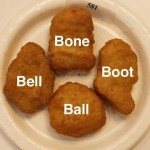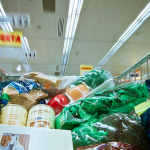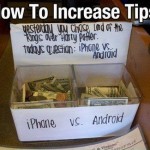12 Ways Fast Food Companies Trick You Into Eating More Junk
1. They make it cheaper to buy “meals” than a la carte items.

Studies have shown that people will eat significantly more when their meals have “variety” than when they consist of just one food. So a customer will consume more calories if their fried chicken comes with a side of mashed potatoes than if it just came with more chicken.
2. They use fake smells to make you think you’re hungry when you aren’t.

That Cinnabon smell wafting through the mall is not an accident.
3. They change the meaning of basic words, like “Large.”

4. They know that seeing a food “can stimulate unplanned consumption” even when you’re not hungry.



5. They keep adding cheese.

Partnerships between the fast food and dairy industries mean there is more cheese in everything. As Dairy Management chief executive Tom Gallagher wrote in a trade publication in 2009, “If every pizza included one more ounce of cheese, we would sell an additional 250 million pounds of cheese annually.”
6. They turned cup holders into meal holders.

Cars: The new dining room.
7. Their restaurants are designed to make us eat too much too fast.


8. They sneak salt, sugar, and fat into items they market as healthy.

Thought your Apple Pecan Chicken Salad was a responsible choice? With 27g of fat, 1350mg of sodium, and 37g of sugar, Wendy’s lowest calorie salad is anything but healthy. That’s more fat than their Double Stack burger (25g), more sodium than their 10-Piece Chicken Nuggets (870mg), and more sugar than their Vanilla Frosty Cone (34g).
9. They remove walking from the eating experience.

The easier it is to get to our food, the more likely we are to eat it. While the drive thru meant we no longer had to get out of the car to get a burger, delivery means we don’t even have to leave the house.
10. They pretend that buying Happy Meals is the same as helping sick children.

As detailed in the recent report, Clowning Around With Charity, McDonald’s has made a lot of money convincing customers that buying a burger is donating to charity. In 2010, for example, the chain claimed that it would donate “proceeds” from all sold Happy Meals to the Ronald McDonald House. But it turned out that by “proceeds” they meant “a penny.”
11. They turned soda into a side dish.

Before Cokes were included in combo meals, most fast food customers didn’t buy them. But once they started grouping it with burgers and fries, soda sales skyrocketed. According to longtime Coke executive Jeffrey Dunn, “From 1980 through 2000 at least, that was the predominant marketing strategy of Coke to build consumption within fast food outlets.”
12. They get us while we’re young.

Because our eating habits start forming before we’ve even taken our first steps, what we eat as kids may determine what we consume as adults. So when fast food companies lure children in with toys, playgrounds, cartoon characters, and a very famous clown, they’re not just peddling Happy Meals. They’re creating lifetime customers
Sourced from Buzzfeed.com

























Recent Comments